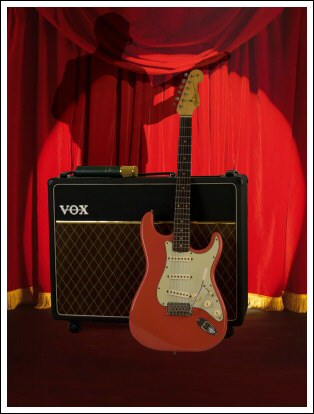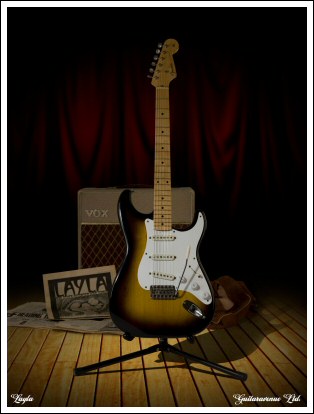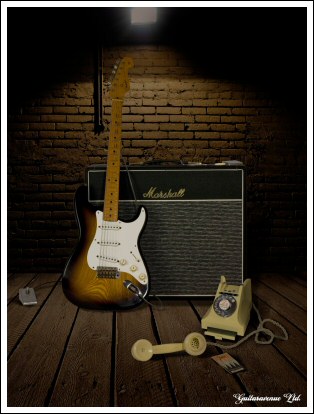|
|
GuitarAvenue - Specialist in Rare
and Vintage Guitars

GuitarAvenue
Here Digger talks
to Gary at Guitar Avenue about his
hobby-turned-business. Gary has forty years experience
in the field and specialises in iconic vintage
guitars. Guitar Avenue now has a worldwide
reputation for service and quality.

Digger:
Good morning Gary.
Gary:
Morning David.
Digger:
How are you?
Gary:
Good thanks.
Digger:
Can you please tell us a little bit of the background to
Guitar Avenue and your background too?
Gary:
Yes, my personal background... I first purchased a Gibson
guitar in 1969 from new.
Digger: You're a youngster!
Gary:
Yes, whilst I worked at a music store as a job. Then I went to
hear a band called Free in March 1970 at The Lyceum and
decided that the old guitar that Paul Kossoff was playing was
much more interesting than the new Les Paul Deluxe that I was
using.
Digger:
Yes. How young were you when you started to learn to play?
Gary:
About fifteen.
Digger: That's relatively late, really.
Gary: Yes, relatively late by a lot of standards. But I learned
pretty quickly, so within two years I could pretty much play
any music.
Digger: You must have got a lot of blisters?
Gary: Yes, but I had a musical background and I think that
helped to throw me forwards a little bit.
Digger: You could read music?
Gary: Yes, and that helped. I used to play other instruments.
So then I bought my first 1959 Les Paul Standard in 1970. I was one of the first people to buy
one other than the likes of
Page, Clapton and Peter Green. That was the start of that. And
I've had an interest in buying and selling guitars from then.
But the Guitar Avenue business has been going just on twenty
years as a full time business. I was doing various businesses
over the years, all sorts of things really, but the passion was
always there for guitars. I was always really active in
collecting, buying and selling. I've been going at it for
twenty years as a full-time job. We did have a period with a
guitar shop which was in Brentwood. We supplied The Guitarist
magazine with most of their centre page collectables for the
best part of a year.
Digger: I went to see a mod band called Shake101 down in
Brentwood a month ago. Very good.
Gary: Yes, I've heard about them. I didn't feel good about being
locked into a store six days a week and, at the time, I was
still seeing people after hours and at weekends for collectable
guitars. With a lot of people who want to buy these you still need
to go and see them and understand their circumstances.
Digger: And you probably got a lot of people coming into the
shop just to have a nose around?
Gary: Yes. My argument with the shop is that it only really
sells the regular low end stuff. It can be a little
uninteresting.
Digger: What gives you the most pleasure from running the
Guitar Avenue business?
Gary: That's easy really. Travelling, not having firm hours
and meeting a complete assortment of fruitcakes!
Digger: (Laughs) I love fruitcakes.
Gary: Yeah. You're probably one of them.
Digger: I probably am actually.
Gary: People who are extreme. We've sold guitars to people for
£20,000 and tried to talk them out of it because it was every
penny they had. The good news is that twenty years later they
became rich from having them.
Digger: So don't listen to your advice then! "Don't buy
it." (Laughs)
Gary: I would say to people "Buy because you're
passionate that you want the guitar and you can afford to
collect it."
Digger: I agree. I've got this rule. A couple of times I
have seen something I liked and been able to afford it but not
bought it, then gone back later and it was gone. So now I
think it's important that if it's right and you've got the
money then buy it.
Gary: Yes. But you've got to have a bit of a passion. There
are people who just buy guitars because they're going up.
Nothing wrong with that but at the same time I would say buy
it because you enjoy it. Otherwise you've got lumps of money
tied up. But yes, it's been very good because of the freedom
and travelling and we meet people from every walk of life.
Digger: You're meeting ordinary people but probably a few celebrities
as well?
Gary: Most celebrity business is done via their guitar technicians.
And although we have a small celebrity client base - Oasis,
Mark Knopfler, the late Gary Moore, Bryan Adams, Eric Clapton
- we don't get to see these people. It's nice to have supplied
the celebrity, especially when you see your equipment used,
that's a big plus. But we're very happy to deal with people
from all walks of life really.
Digger: What are your Unique Selling Points?
Gary: One of the changes in the business has been Google. And
Mr Google has been good for a lot of our customers because
they've managed to cut out the thirty or forty years experience
I've had. And now they're managing to find that they can buy direct
from the source. So that's a plus for the customers. The
two downsides for them are that firstly, if they come to us
they'll probably find that they'll get the instrument for the
same price because we get pretty good dealer discounts. So
they could get the benefit of our experience and advice
effectively for nothing. And the second thing, which is more
importantly, that lots of people come to us with bad guitars that
they've acquired via The Net. We try not to get too involved
once they've bought a bad one because it doesn't do us any
good. But, at the same time, beware of buying from abroad on The
Internet because it's a lot more difficult to return goods. Especially
when VAT and duty probably compound to about 30% of the
price now.

Digger: And then trying to unravel that when you've bought
something....
Gary: Yes, exactly. You have to pay if you send goods back. We
sometimes put on our listing 'A guitar is there for you to
play, enjoy the weight and the feel, the play of it and the
sound.' Come to us and it's £25,000 instead of £23,000 from
the States but you need to stop and think about the distance
because, with us, you can see that's it not broken or over sprayed and we
give a fair returns policy.
Digger: That's a big problem with guitars that have had modifications
or resprays which seriously effect their value.
Gary: Yes. The other thing to point out now is that the
history of most of the vintage dealers in The States is that
they grew up with the 'school' of every guitar would be right. Because
they were originally bought when they were fairly new and over the
years the products just got older and older, worse and worse,
because they're ageing like me. I've got one or two imperfections
now and David I think you probably have.
Digger: Well, I might admit to one or two. Actually (Laughs) I
was talking to a client yesterday and he was giving me some
advice about going to see a doctor! (Both laugh) It just goes
to show.
Gary: Yes, I don't doubt that you do need some medical help
there. (Digger laughs)
Digger: Bobby Graham, the great session drummer who died a couple of
years back, was telling me once about the day he was on Jersey with
his old friend Jet Harris from The Shadows, both as middle-aged men.
They were on the beach and discussing hanging baskets. Bobby
pointed out to Jet that it was a sign of age because thirty
years before they would have been leading the rock and roll
lifestyle with drink and women and other substances as well and certainly not
discussing hanging baskets.
Gary: The thing is we are in England. And although we do send a
lot of guitars to Europe it is very easy for them to come to
England if they need to. And basically you are getting the benefit
of many, many years experience. We've had many guitars in
published books, we've supplied most of the expensive guitars
to the Ultimate Guitar book and we supplied over thirty original
Burst guitar pictures which I owned to Vic Da Pra's books, and
he's a specialist in the Les Paul Standard. So we do have a
history that's recognised and most dealers in the world will
give us a good recommendation. And so that's probably one of the
main reasons for buying from us.
Digger: I should imagine that a lot of the younger musicians
are buying because they've got this thing about authentic
vintage musical instruments and the authentic sound, haven't
they?
Gary: Yes, there's youngsters coming through and they still
appreciate the old guitars. But what they've got to do is
they've got to get the funding for them as they get older. And as they get more money, they jump on the bandwagon.
There is also a big marketplace in handmade replica guitars
because they're great instruments with a lot of expertise
behind them now.
Digger: And affordable as well.
Gary: Yes, and affordable. So there's that movement too.
Digger: You just have to know what you're going for and ultimately
they will become your customers as well.
Gary: That's right.
Digger: What are your best sellers and who are your typical
customers, if you have a typical customer?
Gary: Most of our customers are people that need medical help
in one way or another. All guitar people are obsessed and
fruitcakes and none of them know what they want and when they
get it the grass is always greener...
Digger: I thought it was drummers who were the crazy ones?
Gary: No. Drummers give you an idea of crazy but guitarists
take it to the next level. They range from people who have no
money who would still find £2,000 to £5,000 because they
have to own a guitar, to people that are multi-millionaires. There's
no reason for any of them to be - usually the most passionate
people are the easiest to deal with. It's certainly not the
richer people or the poorer people, just the most passionate.
But it's really all people are customers - there are people
that like to hang them on the wall and can't tune them and
they see them as art. It's the musicians that buy good guitars
but usually can't afford the best because they're underpaid. It really is a cross-section, but usually they're
obsessive. And they do tend to buy for multiple ownership of guitars and they
really don't need as many as they have. The other day one of
my clients said he had eighty guitars, all expensive, and it's his
sideline hobby.
Digger: But he is sitting on a bloody good investment there as
well.
Gary: He is.
Digger: Never mind pensions or stocks or putting money in the
bank. Put your money into something tangible these days.
Gary: Yes. One of the things is that old guitars have outstripped
most investments. They've gone backwards in the last two years
but now they've stabilised again. They still have done much
better than most things. And rich people, investors, art collectors
- there's lots of various people who are buying. Also the Les
Paul Standard - that's the '58 to '60 Sunburst Les Paul
Standard, is recognised as iconic. It goes into the same
auctions as the Stradivarius violin, so it's made its mark in
history.
Digger: Did you see that great programme on TV the other month
about Les?
Gary: Yes. That was a great programme. And to my knowledge,
which is probably limited because you don't hear much, one has sold
for $1.5 million. That gives you a little bit of a background.
Digger: What does The Internet mean to your business?
Gary: It's a two-edged sword. Going back to what I said, it
takes a lot of expertise out of it because people feel they
can pay with Paypal and they have a guarantee for the goods.
That's my word of warning to them. The plus is the world's
become much smaller and people have become fairly happy about
shipping worldwide and trading on The Internet. And certainly
the strongest market for us at the moment is Europeans. They
must be getting the benefit of the Euro rate.
Digger: What about eastern Europe? Because a vinyl client of
mine was saying he was selling a great deal to eastern Europe,
which is good, but he was worried that over time all of our
collectables 'heritage' would have been shipped abroad to
Russia, Turkey and eastern Europe.
Gary: I don't do a lot of business in eastern Europe. That
heritage thing was an argument from the Americans many
years ago when they would send all the stuff to us and to
Japan. But bear in mind Japan's economy has not been great and
so they have been selling stuff. It seems to find a natural
way to move around.
Digger: Yes, that's a fair point. And finds its way back home.
Gary: Yes, and the other thing is it has become a worldwide community.
You can go on eBay and it's seen by the world - it's like a
global village. The pluses are that it opens up new avenues
for us and everybody and the down side is that everybody
becomes an instant expert. When people say to me "How do
you find out if a pink Strat from '62 is a genuine pink Strat from
'62?" I say "Buy about 100 pink Strats and handle about
1,000 Strats then you'll still be learning but you'll have
more of an idea."
Digger: You can't buy that forty years experience that you've
got.
Gary: No and we're always learning. I tell people who read
books on the subject that books are a general thing and they
don't cover right and wrong, it's limited information and
there's a lot of things that are not in books. A lot of
one-offs. What I say to people when they are looking for a particular
guitar is "How many of these have you owned?" And
they say "Well, I have the book." And I say
"The book really is just a guide and you need to own the
guitar to really understand and get the knowledge."
Digger: In what direction are your planning to take Guitar Avenue
in the future Gary?
Gary: I think it will plod along, I think prices will recover
and I think there will be a new generation of people slowly,
slowly.
Digger: Is the sourcing of items harder these days?
Gary: Sourcing continually is difficult and sourcing of the
items is probably going to be more difficult for selling on unless we get a rush on currency. If the dollar went to two to
one then they would be cents, but whilst the currency's at mid
rate then sourcing's probably harder than selling, yes. I do
get a lot of recycled goods. We've been selling the stuff for
so long that we do have a database of people that have bought
from us and will eventually 'return' goods to us. So that helps.
Digger: You don't have problems with obtaining the spares for repairs?
Gary: Not really, we still gets spares for guitars. But,
generally speaking, people who bought years ago, they're happy because
they've made money, and because they've made a lot of money
they come back to us. So we do have a portfolio of old customers
which brings the guitars round and round again.
Digger: Thanks for that insight into the vintage guitars world
Gary.
Gary: Have a good day David. Thanks very much.


GuitarAvenue
Electrics,
Basses, Acoustics, Amps, Drums, Effects.
GuitarAvenue is pleased to announce it's new repair
workshop specializing in high quality instrument repairs
and custom modifications, etc. Contact us to discuss
your requirements. Our service includes the following:
- Set ups
- Fret dress
- Refret
- Nut replacement
- Damage & repairs
- Refinishing
- Customizing
- Historic Les Paul makeovers
Phone (from UK): 01245 401066
International: +44 1245 401066
info@guitaravenue.com
|
|
|